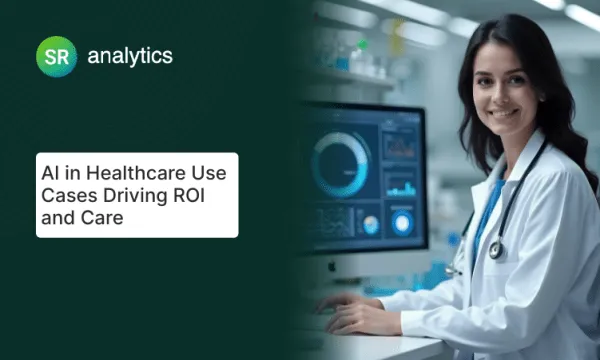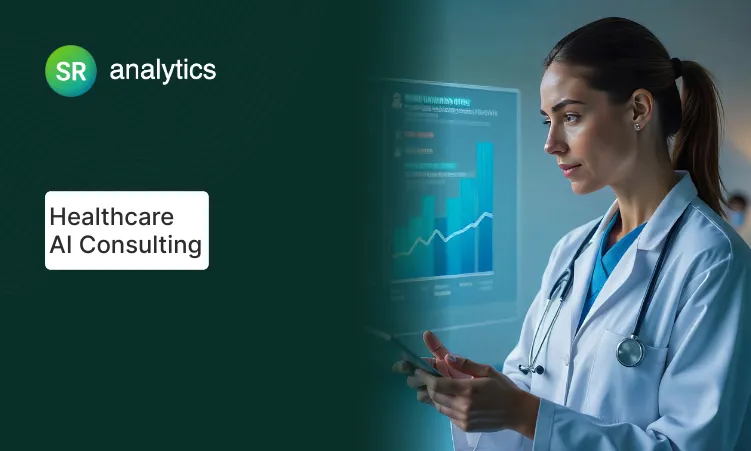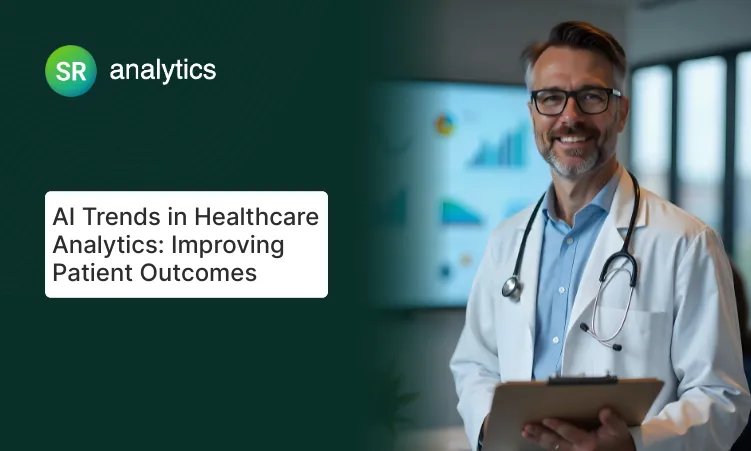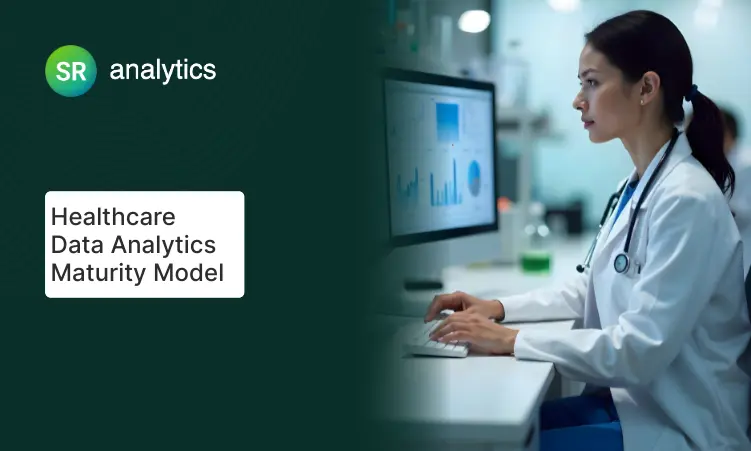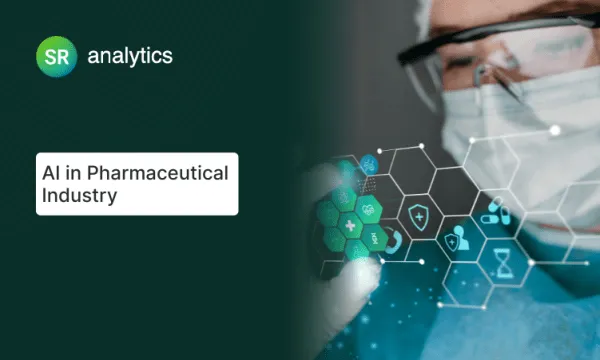Highlights
- AI diagnostic tools achieve 90%+ accuracy in detecting cancers that human clinicians might miss
- Johns Hopkins’ TREWS system reduces sepsis mortality by 18% through predictive early intervention
- Generative AI creates 25,000 antibiotic candidates in hours versus traditional 10-15 year cycles
- Administrative AI automation cuts documentation time by 60% for healthcare professionals
- AI-powered remote monitoring reduces hospitalizations by 40% for chronic disease patients
- Healthcare organizations report $55-72 million annual savings from comprehensive AI implementations
- AI systems prevent 795,000 diagnostic errors annually that cause patient deaths or disabilities
“Are you building a healthcare AI strategy that transforms patient outcomes, or one that gets stuck in proof-of-concept purgatory?”
Imagine your hospital’s emergency department overwhelmed with patients, radiologists missing subtle cancer signs due to fatigue, and administrative staff drowning in documentation. Now picture AI systems that spot life-threatening conditions hours before human experts, predict patient deterioration with unprecedented accuracy, and automate routine tasks so clinicians can focus entirely on healing.
This isn’t science fiction – it’s happening right now in hospitals worldwide. The AI in healthcare use cases we’ll explore have moved beyond pilot programs to deliver proven, measurable results that save lives and reduce costs. With healthcare facing unprecedented challenges from staff shortages to rising costs, choosing the right AI solutions in healthcare can determine whether your organization thrives or merely survives.
What Makes These AI Healthcare Use Cases Actually Work?
The difference between successful healthcare AI use cases and expensive failures isn’t just technology – it’s implementation strategy, data quality, and organizational readiness. The five AI in healthcare use cases we’ll examine share common success factors:
- Real-World Impact: Measurable improvements in patient outcomes or cost reduction
- Clinical Integration: AI augments rather than replaces healthcare professionals
- Proven ROI: Concrete returns on investment, not just theoretical benefits
- Scalable Implementation: Solutions work across different hospital sizes
Let’s examine these game-changing AI in healthcare use cases transforming modern medicine.
1. Early Disease Detection & Diagnostics: AI’s Precision Revolution
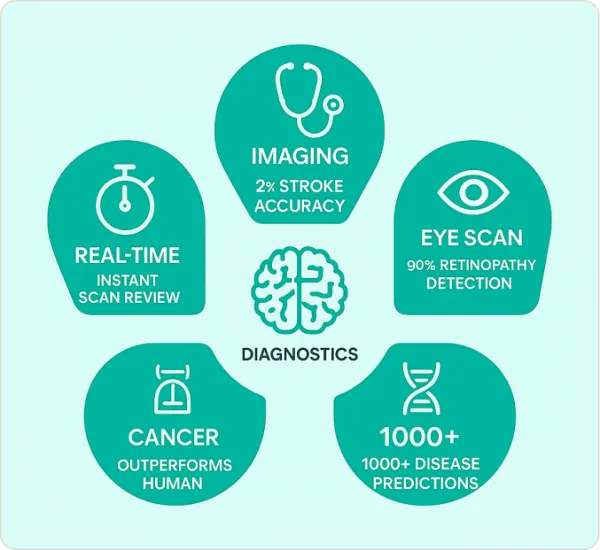
AI-driven diagnostic systems represent perhaps the most compelling AI in healthcare use cases, delivering accuracy rates that often exceed human performance while processing medical data at unprecedented speed.
Medical Imaging Breakthroughs
The statistics behind AI in healthcare use cases for diagnostics are remarkable. World Economic Forum research reveals that AI software analyzing stroke CT scans demonstrates twice the accuracy of human experts. In the UK, 64% of epilepsy lesions overlooked by human radiologists were successfully identified by AI systems.
Key achievements include:
- Google’s AI for diabetic retinopathy achieving over 90% accuracy rates
- Stanford’s skin cancer detection AI exceeding traditional screening methods
- FDA-approved systems processing thousands of scans in seconds
- Real-time anomaly detection in X-rays, MRIs, and CT scans
Pathology and Genomics Applications
Among innovative generative AI use cases in healthcare, researchers from AstraZeneca developed an AI model capable of predicting over 1,000 diseases years before symptoms emerge. The FDA-approved Zebra Medical Vision AI reads CT lung scans and detects lung cancer and bone fractures at significantly higher rates than traditional methods.
Nearly 795,000 Americans die or become disabled yearly due to diagnostic errors according to BMJ research. AI in healthcare use cases focused on early detection offer a pathway to reduce these tragic outcomes.
2. AI Predictive Analytics in Healthcare: Anticipating Problems Before They Strike
Rather than waiting for medical emergencies to unfold, AI predictive analytics in healthcare can anticipate patient risk and trigger early interventions, representing a fundamental shift from reactive to preventive healthcare delivery.
Sepsis Prevention Success
Johns Hopkins’ TREWS (Targeted Real-time Early Warning System) monitors patient vitals and lab results in real time, alerting clinicians hours before sepsis symptoms worsen. Clinical studies demonstrate that TREWS reduced sepsis deaths by approximately 18% while shortening length-of-stay by 1.5 days. Similarly, Kaiser Permanente’s “Advance Alert Monitor” has saved approximately 500 lives per year by detecting patient deterioration early.
Risk Stratification and Readmission Prevention
Centers for Medicare & Medicaid Services data reveals that 3.8 million U.S. patients are readmitted within 30 days at a cost of $52.4 billion annually. Predictive models help care teams intervene proactively through:
- Arranging home care services before discharge
- Medication management and monitoring programs
- Targeted follow-up appointments for high-risk patients
- Real-time alerts for deteriorating patient conditions
Cleveland Clinic’s AI dashboard now forecasts individual patient readmission risk, while Medtronic’s remote heart-failure monitoring program results in 40% fewer hospitalizations for participating patients.
3. Precision Medicine & Generative AI Healthcare: Personalized Treatment at Scale
Generative AI healthcare applications enable truly personalized treatment planning based on each patient’s unique data profile, analyzing genetics, lifestyle factors, and treatment responses to tailor therapies with unprecedented precision.
Individualized Treatment Plans
Memorial Sloan Kettering’s Watson for Oncology matches cancer patients to individualized chemotherapy plans using historical data from thousands of cases. Dexcom’s AI-enhanced glucose monitors predict blood sugar trends and suggest insulin adjustments before dangerous fluctuations occur.
As one endocrinologist explained: “Every patient’s diabetes is unique. AI helps me understand the subtle patterns in their glucose data, sleep, and activity levels. It’s like having a personalized diabetes coach for every patient.”
Revolutionary Drug Discovery
Generative AI use cases in healthcare are transforming pharmaceutical research. Stanford researchers used generative AI (SyntheMol) to create approximately 25,000 candidate antibiotic molecules within hours, with several proving effective against antibiotic-resistant bacteria.
Key advantages of AI-driven drug discovery include:
- Accelerating development timelines from decades to months
- Reducing research costs by billions of dollars
- Identifying novel therapeutic targets invisible to human researchers
- Creating personalized medications based on genetic profiles
AI solutions in healthcare analyzing genomic data demonstrate 85% accuracy in finding cardiovascular risk cases through genetic analysis. Market forecasts project the wearable health device market will reach $70 billion by 2028, with a McKinsey survey showing 98% of healthcare providers believe AI will support 40% of clinical work hours.
4. AI Solutions for Operational Efficiency: Streamlining Healthcare Operations
Beyond direct patient care, AI solutions in healthcare optimize hospital operations and reduce administrative burdens, freeing up valuable time for healthcare professionals to focus on patient care.
Documentation and Administrative Automation
AI-powered medical scribes like Nuance’s Dragon Medical automatically generate comprehensive clinical notes, reducing documentation time by up to 60%. One emergency department physician shared: “Before AI documentation, I’d stay two hours after my shift finishing notes. Now I leave when my shift ends, and the notes are more comprehensive.”
Administrative automation delivers measurable benefits through:
- Automated prior authorization processing (minutes vs. days)
- AI-powered claims processing and fraud detection
- Smart scheduling systems that optimize patient flow
- Real-time coding assistance that reduces billing errors
Workflow Optimization and Financial Impact
Cleveland Clinic uses a real-time AI dashboard to match bed availability and staff assignments to patient acuity levels, reducing average length-of-stay by approximately 0.8 days. Mount Sinai’s AI alert system has triggered 23% fewer unexpected ICU transfers by identifying at-risk patients early.
Studies estimate that healthcare organizations can achieve $18-50 billion in annual savings through administrative automation alone, as detailed in Harvard Business Review’s analysis of healthcare AI implementations.
5. Virtual Health Assistants & Remote Monitoring: Expanding Access and Engagement
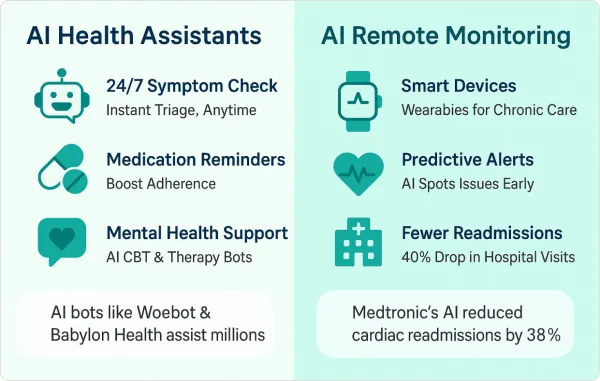
AI solutions in healthcare are enhancing patient engagement and expanding healthcare access through virtual assistants and remote monitoring systems, addressing critical gaps as the World Health Organization estimates a global physician shortage of 11 million by 2030.
AI-Powered Digital Health Assistants
AI-powered chatbots provide 24/7 symptom triage and patient support. Babylon Health’s AI bot conducts comprehensive symptom assessments, while Woebot’s AI “conversational agent” delivered cognitive behavioral therapy to thousands of patients during the pandemic, filling critical gaps in mental health services.
Virtual health assistants excel at:
- 24/7 symptom triage and initial patient assessment
- Medication reminders and adherence monitoring
- Mental health support and cognitive behavioral therapy
- Health education and preventive care guidance
Remote Monitoring and Chronic Disease Management
Internet of Things devices including smartwatches, glucose sensors, and blood pressure monitors, when combined with AI analysis, alert healthcare providers to problems between scheduled visits. Heart failure patients participating in Medtronic’s AI-enabled monitoring program experienced 40% fewer hospitalizations and 38% fewer readmissions.
In the UK’s National Health Service, AI triage and appointment scheduling bots are credited with reducing accident and emergency department wait-time deaths by approximately 300 fewer cases per week.
The Future of Healthcare AI: Emerging Generative Applications
Generative AI healthcare represents the next frontier in medical AI applications. Unlike traditional machine learning systems that analyze existing data, generative AI can create new content including clinical notes, treatment recommendations, and even molecular structures for drug development.
Tools like Nuance Dragon and emerging large language model-based scribes automatically generate visit summaries from physician-patient conversations. Research indicates that doctors currently spend approximately 15 hours per week on administrative paperwork – time that AI can help reclaim for patient care activities.
Nearly 98% of healthcare executives surveyed believe generative AI will enhance productivity, potentially handling up to 40% of routine clinical tasks. Advanced chatbots trained on medical literature already answer over 50% of physician queries correctly, while hospitals pilot “AI medical assistants” that draft discharge instructions and provide clinical decision support —an innovation increasingly supported by Data Analytics Services.
Implementation Strategy: Your Path to AI Success
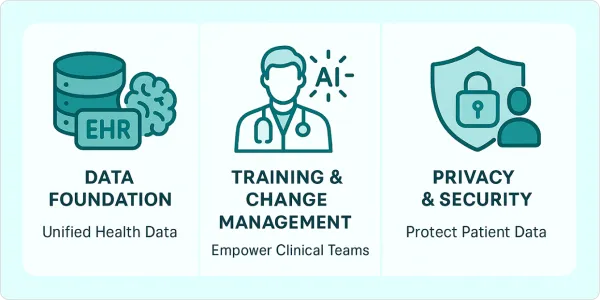
Healthcare organizations considering AI in healthcare use cases implementation must address several critical factors to ensure successful deployment and optimal patient outcomes.
Key Success Requirements:
- Data Foundation: Successful healthcare AI use cases require high-quality, integrated health data from electronic health records, medical imaging systems, and wearable devices. Healthcare data analytics forms the foundation for reliable AI results.
- Training & Change Management: Healthcare professionals need comprehensive training to work effectively with AI solutions in healthcare, including understanding AI capabilities, interpreting insights, and maintaining clinical judgment through structured programs.
- Privacy & Security: Healthcare AI use cases must comply with strict privacy regulations while protecting patient information, with 57% of healthcare leaders expressing concerns about AI data breaches requiring robust cybersecurity frameworks.
Measuring Success: ROI and Patient Outcomes
The most compelling evidence for AI in healthcare use cases comes from measurable improvements in patient outcomes and operational efficiency. Successful healthcare AI use cases demonstrate improved diagnostic accuracy, reduced medical errors, and enhanced patient safety scores.
AI predictive analytics in healthcare systems can be evaluated based on their ability to prevent adverse events, reduce emergency department visits, and decrease unplanned hospital readmissions. Administrative AI solutions in healthcare should demonstrate reduced processing times and improved resource utilization.
Financial ROI calculations should include both direct cost savings and indirect benefits such as improved clinician satisfaction, reduced burnout, and enhanced patient experience scores.
What This Means for Your Healthcare Organization
Whether you’re exploring AI in healthcare use cases for the first time or scaling existing implementations, the evidence is clear: AI solutions deliver measurable value when implemented thoughtfully with appropriate data infrastructure, clinical training, and patient safety protocols.
For clinical teams, these healthcare AI use cases determine how quickly you can diagnose conditions, predict patient deterioration, and personalize treatments. For hospital administrators, they influence operational efficiency, cost management, and competitive positioning. For patients, they impact care quality, safety, and access to advanced treatments.
Conclusion – From AI Potential to Healthcare Reality
The AI in healthcare use cases explored in this analysis have definitively moved from experimental technology to essential healthcare infrastructure. From diagnostic imaging achieving superhuman accuracy to generative AI healthcare accelerating drug discovery by decades, these applications demonstrate AI’s capacity to improve patient outcomes while reducing costs.
The most successful healthcare organizations recognize that AI in healthcare use cases aren’t about replacing human expertise – they’re about amplifying it. They’re crafting comprehensive AI strategies that leverage early detection capabilities, predictive analytics power, and operational efficiency gains to deliver exceptional patient care.
Your next move: Assess your current data infrastructure, evaluate your team’s readiness, and start with a pilot project testing your chosen AI solutions in healthcare. Whether implementing diagnostic AI, AI predictive analytics in healthcare, or generative ai use cases in healthcare, begin your transformation journey with clear objectives and measurable outcomes.
Need expert guidance implementing AI in healthcare use cases that align with your organizational goals? SR Analytics helps healthcare organizations transform raw data into life-saving insights through custom analytics solutions delivering measurable results.

